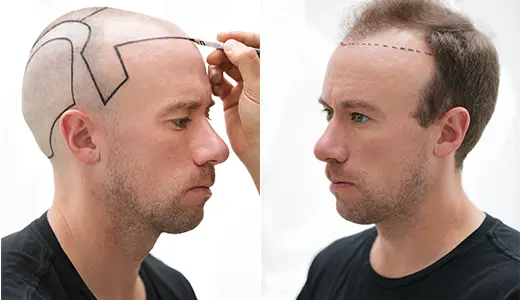Hair Transplant and Genetic Testing: How Your DNA Impacts Hair Restoration
Hair loss affects millions of people worldwide, and for many, the solution lies in a well-executed hair transplant. However, not all hair loss follows the same pattern or cause. With the growing awareness of genetic influence, the connection between hair transplant and genetic testing has become increasingly important.
Understanding your genetic profile can provide insights into the root causes of hair loss and help guide personalized treatment strategies. Clinics now combine advanced genetic analysis with traditional evaluation methods to offer more accurate and lasting solutions.
Why Genetics Matter in Hair Loss Diagnosis
Genetic factors are among the leading causes of hair thinning and baldness, particularly in conditions like androgenetic alopecia. The relationship between hair transplant and genetic testing allows clinics to determine the likelihood of continued hair loss, identify stable donor areas, and assess future risks.
Thanks to this approach, clinics such as Hair of Istanbul can build more effective, long-term treatment plans tailored to each patient’s biological makeup.

How Genetic Testing Supports Better Hair Transplant Outcomes
Genetic testing reveals markers associated with hair loss severity, progression rate, and responsiveness to treatments. With this knowledge, surgeons can decide whether a patient is an ideal candidate for procedures like fue hair transplant or dhi hair transplant.
A well-planned procedure based on the relationship between hair transplant and genetic testing offers more predictable and natural-looking results. It also allows for early intervention in younger patients, potentially slowing or managing progression before more invasive steps are needed.

Predicting Long-Term Success Through Genetic Profiling
By analyzing DNA and genetic indicators, specialists can better understand whether hair loss will continue after transplantation. This helps avoid transplanting grafts into areas likely to thin again in the future.
One key advantage of combining hair transplant and genetic testing is that it increases the accuracy of both diagnosis and treatment mapping, resulting in higher success rates and patient satisfaction.
Customizing Treatment Based on Genetic Variations
Not every patient responds to medications or surgical procedures in the same way. Genetic differences can explain why some individuals benefit more from a certain approach than others. A thorough understanding of genetic predisposition enables clinics to tailor post-operative care and medication choices for optimal results.
Clinics offering hair transplant for women particularly benefit from this method, as female hair loss often presents in more diffuse and unpredictable patterns.
Before and After Hair Transplant
Reviewing before and after hair transplant photos can highlight the visual impact of combining medical science with surgical precision. Patients who undergo thorough preoperative evaluations, including genetic testing, are more likely to achieve consistent and aesthetically pleasing outcomes.
The success stories shared by clinics such as Hair of Istanbul demonstrate the transformative power of an informed and personalized approach to treatment.
Bu gönderiyi Instagram’da gör
Assessing Candidacy with Greater Accuracy
Genetic screening helps determine whether a patient’s donor area is genetically resistant to hair loss, which is crucial for transplant viability. This insight ensures grafts are harvested from areas less likely to thin in the future, maintaining long-term density.
With the combined strategy of hair transplant and genetic testing, patient candidacy assessments become more than visual estimates—they are scientifically validated decisions that support better planning and outcomes.
Reducing the Risk of Overcorrection or Under Treatment
Hair loss is not a one-size-fits-all condition. Without genetic context, some patients may undergo too little or too much surgical correction. By understanding the rate and scope of genetic hair loss, clinics can adjust surgical density and graft placement accordingly.
This precision reduces the chance of future revisions and enhances the overall value of the initial transplant, making hair transplant and genetic testing an inseparable pair in modern hair restoration.
Enhancing Patient Confidence and Transparency
Knowledge is power. When patients are informed about their genetic profile, they are better prepared for the journey ahead. This includes setting realistic expectations and understanding their role in ongoing care and maintenance.
By integrating hair transplant and genetic testing, clinics foster trust, promote collaboration, and encourage patients to take active control of their hair restoration journey.
Special Considerations for Afro Hair and Complex Cases
In complex cases, including afro hair transplant, genetic testing can identify hair characteristics and skin types that affect graft survival. This helps surgeons adapt extraction and implantation techniques for optimal results in diverse hair types.
Additionally, patients who seek treatment abroad—for instance, in hair transplant istanbul or hair transplant turkey often prefer clinics that integrate advanced diagnostics, including DNA-based analysis.
Preparing for the Surgery with Informed Decisions
Thorough preoperative planning is key to success. Genetic evaluation allows patients and surgeons to prepare for the procedure both physically and strategically. Clinics that include hair transplant care after guidelines in their preparation help patients manage the recovery process smoothly and avoid preventable issues.
Combining hair transplant and genetic testing ensures each surgical decision is backed by data, not just visual inspection.
Conclusion
The future of hair restoration is personalized. The synergy between hair transplant and genetic testing allows clinics to go beyond the surface, identifying the root causes of hair loss and tailoring procedures to each individual’s biological blueprint.
Patients who invest in proper diagnosis and precision-based planning are more likely to enjoy natural, dense, and lasting hair growth. Partnering with a trusted clinic like Hair of Istanbul makes this vision a reality.







